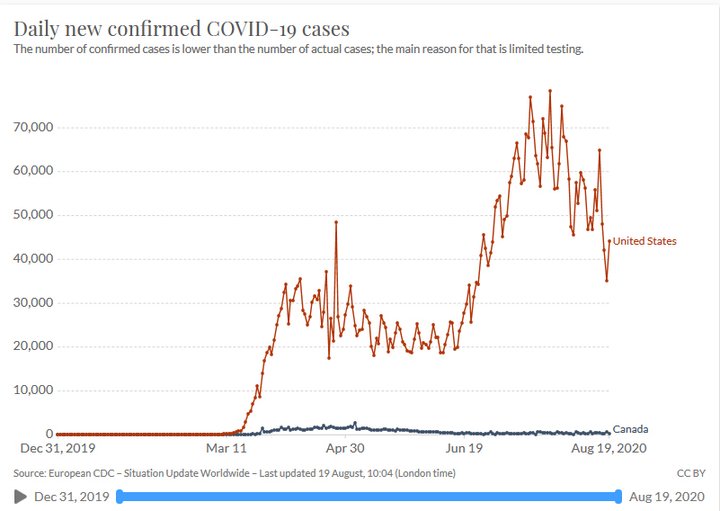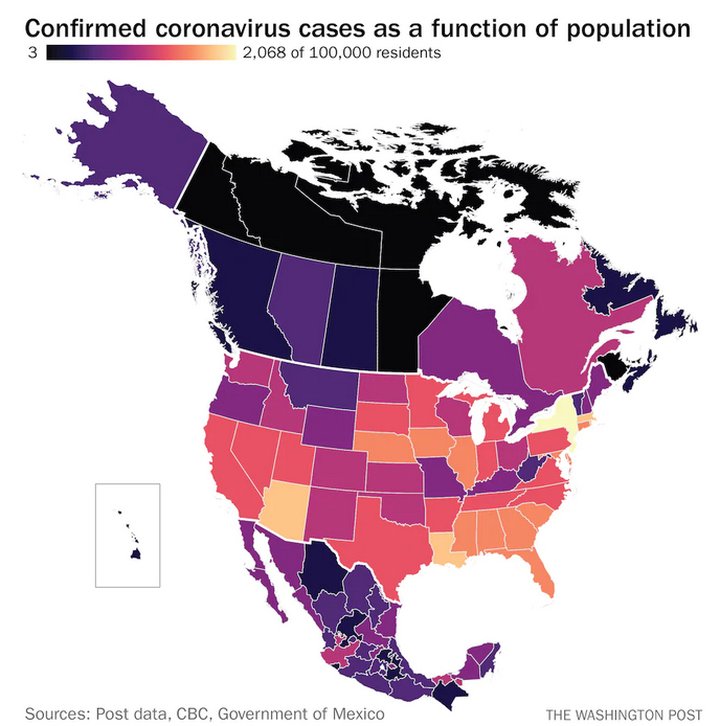“Canadian
officials have consistently deferred to public health experts and
scientists to drive policy decisions and have offered a generally
consistent message.” (Amanda Coletta, Washington Post)
###
Several commentators took me to task last week for my suggestion that the reason why this country was doing so badly dealing with the coronavirus crisis is our cult of individualism. I wrote, in reference to the Japanese people, “They’re fortunate in that they don’t have our ’Murica-Land-of-the-Free mentality.” Several responders pointed out that it’s hardly fair to compare the US with Japan, given our very different cultural backgrounds. In particular, Japan is pretty homogeneous compared to the US, with few of the federal vs. state tensions that we have.
Fair enough. If I’m going to make comparisons, I should do so by looking at a country with a background and governmental system more akin to ours. How about the one immediately north of us? Like the US, Canada is made up of disparate geographical groups—instead of our 50 states and 14 territories, Canada (with 11% of our population) has 10 provinces and 3 territories. It’s hardly unified in the way Japan is, so is more of an apt comparison with the US. (For instance, Quebec has long flirted with independence. In 1995, a referendum was evenly split between those voting for independence and those wanting to continue being part of Canada.)
Here’s how the Covid numbers look as of last Wednesday, comparing the US and Canada:

Perhaps more to the point, our death rate per million people is 524, nearly twice that of Canada’s 245. And per capita, we have more than three times as many total infections as Canada—although our testing rate is higher than theirs. So I stand by what I wrote last week about individualism. I do think it’s fair to say that Canadians have been more disciplined and less divided than Americans in their response to the pandemic, and that while science skepticism has been promoted here from the top down, the political leadership up there has consistently followed the advice of people who actually study viruses for a living (imagine!). And since, as far as we know, the virus has no party affiliation, politicizing it—whether from the left or right wing—is pretty absurd. As Neil deGrasse Tyson says, “The good thing about science is that it’s true whether or not you believe in it.”
Canadians also had the prior experience if dealing with the 2003 SARS coronavirus epidemic, which killed 44 people in Toronto alone. (The US had no deaths from SARS.) Canada’s publicly-funded healthcare system gives it another advantage, since people believing they have Covid-19 symptoms don’t avoid getting help for fear of the cost of diagnosis and treatment.
Canada wisely closed its border with us last March to all but essential travel. So did Mexico. Here’s why, based on a Washington Post image from mid-July (I couldn’t find a more up-to-date version):

A couple more follow-up points from last week.
Masks with valves: The CDC just issued a recommendation against masks with one-way valves which “allow exhaled air to be expelled out through holes in the material. This can allow exhaled respiratory droplets to reach others and potentially spread the COVID-19 virus.” Cloth masks, despite their limitations, are better at limiting your possibility of infecting others. And (again) they protect the wearer to some degree by limiting the “viral load” in the presence of someone who’s infected.
Testing: Because an FDA-approved universally-available Covid-19 vaccine is, in all likelihood, a year away, more testing is essential to restarting business, schools, everything. If we don’t know who’s infected and how extensive infections are, we’re stuck with the current “assume the worst” situation—everyone is a potential carrier. The problem is that current tests are of limited use, since it can take up to two weeks for the results to come back (by which time most people are no longer infectious); they’re also expensive to administer and have to be done in medical facilities. What’s needed right now is a Covid version of the cheap, at home, three-minute pregnancy test. Turns out—according to this August 14 story in The Atlantic—there is such a test, with more under development. While not as accurate as current tests, they could be a way out of our current impasse while we wait (and wait, and wait) for a safe and effective vaccine.
Wear your mask, eh?
CLICK TO MANAGE